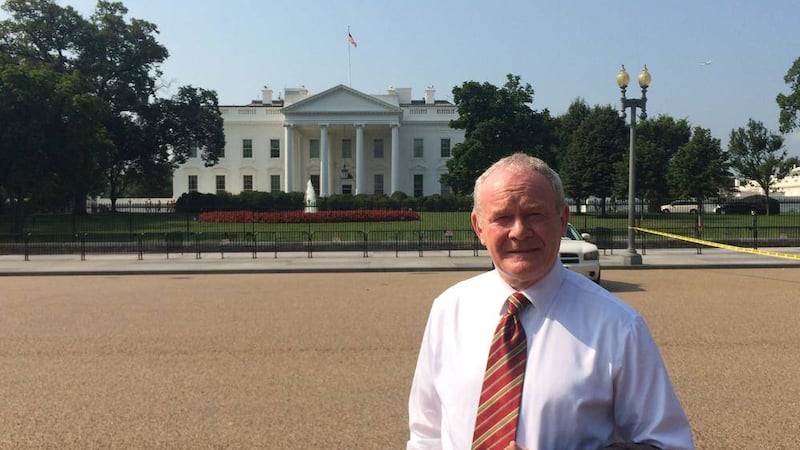A TRANSATLANTIC trip by Martin McGuinness to brief the US administration on the political crisis in Northern Ireland has been branded a "waste of time" by the DUP.
Stormont's Sinn Féin Deputy First Minister arrived in Washington last night ahead of three days' of meetings, including briefings with officials from the State Department.
The visit has coincided with a trip to the US by Northern Ireland Secretary Theresa Villiers.
Ms Villiers, who arrived yesterday, will also update senior figures in the administration during a series of meetings that were arranged in the wake of the general election in May.
DUP finance minister Arlene Foster said Mr McGuinness would have been better served staying in Northern Ireland talking with political counterparts at Stormont about resolving the budgetary crisis that is threatening powersharing.
"Martin McGuinness's trip is a waste of time because Westminster of course is in charge of our budget," she said.
"After these visits have taken place we will get a statement from the (US) administration urging us all to work together and that's exactly what we should be doing here in Northern Ireland. There is no need to go to America to get that message across."
Power-sharing in Northern Ireland is in danger of collapse due to a bitter row over the implementation of welfare reform, which has been vetoed in the assembly by Sinn Féin and the SDLP.
Without rolling out the UK government's changes to the benefits system, last year's wide-ranging Stormont House Agreement between the executive's five parties and the British and Irish governments is in limbo.
The deadlock has contributed to a black hole in the executive's budget running to hundreds of millions of pounds.
While initially voicing support for the overall Stormont House Agreement, Sinn Féin later withdrew backing for the welfare reform section – claiming proposed executive-funded top-up schemes for claimants were not as comprehensive as they envisaged.
The government and the unionist parties have blamed Sinn Féin's stance on welfare for the crisis, while the republican party claims the root of the problem is the government's "austerity agenda".
Mrs Foster said Sinn Féin's decision to "walk away" from the Stormont House Agreement had put the institutions "in peril".
She said collapse would jeopardise important Stormont policy positions, such as limiting student tuition fees and blocking the introduction of water charges in the region.
Mrs Foster said her party stood ready to engage in talks to resolve the issue – but insisted negotiations had to be on the basis of the financial package agreed in the Stormont House deal.
"The American government don't have any role in terms of welfare reform or indeed the budget we receive from the United Kingdom government, that is a matter for the chancellor and the prime minister," she said.
"That's why I am saying time would have been better spent here in Northern Ireland."
The welfare deadlock has put the rest of the measures contained in the Stormont House accord on hold.
Those include the devolution of corporation tax powers to Belfast, access from the Treasury to £2 billion of additional spending powers, a major civil service redundancy scheme and new institutions to deal with the thorny legacy of the Troubles.
After meeting with State Department officials at the White House, Mr McGuinness described the encounter as "positive and encouraging".
"The US administration clearly remains engaged with the political process in the north and they continue to play a constructive role," he said.
"At the meeting I made it clear to them that the institutions of the Good Friday Agreement, which have underpinned the peace process for almost two decades, are facing a real crisis as a result of the policies of this British government.
"The political institutions, and the progress we have made over the last two decades of the peace process, are under a real threat and it is my hope that the US administration can encourage the British government to take a more positive approach on dealing with the north."








